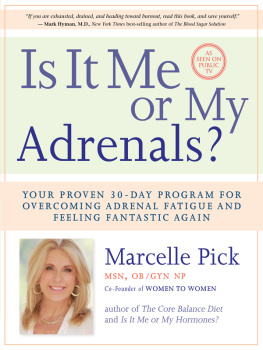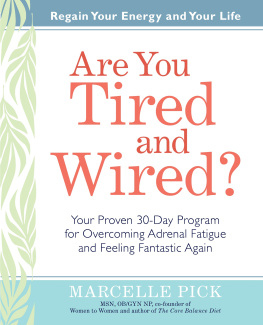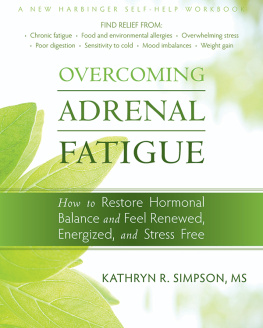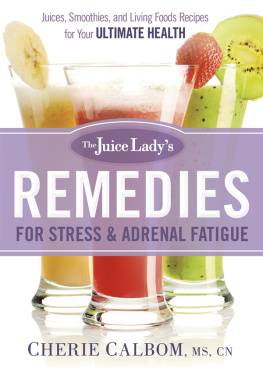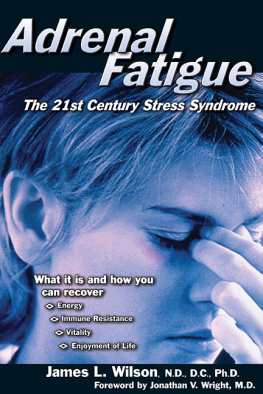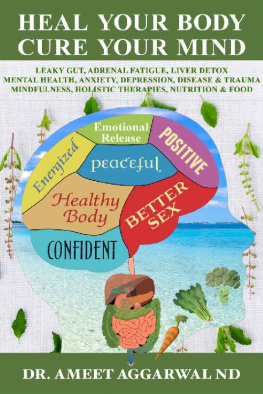Table of Contents
Restoring the Balance of Hormones: How to Fix Adrenal Fatigue
Natural Ways to Control the Syndrome
By: Joy Marensky

Chapter 1- : Adrenal Glands- Their Function in the Body
The adrenal glands sit in a 'renal' (above) position over the kidneys. They are extremely powerful in spite of their small size. They are the manufacturers and producers of hormones and they secrete nearly 50 various hormones that include steroid hormones like:
Cortisol
Adrenalin
Estrogen
Aldosterone and
Testosterone
which are crucial to everyone's health and vitality; they have a very significant effect on how every tissue, gland, and organ within the body functions.
They are instrumental in keeping fluids balanced and regulating blood sugar. Most people have no clue that they also control the functioning of the immune system and regulate the way we think and feel. Humans cannot live without the hormones produced by the adrenal glands. Anytime they get out of balance, health becomes compromised.
They help to keep stress levels in check. They are a check against negative reactions to things like:
Drugs
Alcohol
Cancer
Infections
Autoimmune Disorders
Environmental Allergens
Foods
and more. They are involved in how our bodies utilize fats and carbohydrates. They are invaluable little glands that we simply cannot do without.

Menopause
Once women are into mid-life (menopause), their adrenal glands begin to take over as the main source of sex hormones. It is the same for men at mid-life. They affect vital psychological, emotional, and physical aspects of all of us. If a person has a tendency to gai weight, this is affected by the adrenal glands.
Because they control the immune system, they play a huge role in the development of certain diseases and how we respond to chronic illnesses. Life without adrenal hormones is impossible.
Symptoms of Adrenal Fatigue
Stress has been labeled as the biggest killer today. This is because it is seen as being at the root of most all diseases and sicknesses. Adrenal fatigue may have some of the following symptoms:
Tired for no apparent reason
Craving salt or sweets
Need coffee for energy
Trouble waking up in the morning
Having fun evades you
Too tired for enjoying life
Decrease in sex drive
Feel it's a struggle to keep up with life
Run down and depressed
Have a hard time bouncing back from sickness
And, there are more. Understanding how the adrenal glands function in the body can help you to create a plan of action that can save you a lot of heartache.
Most all of the common problems that are associated with the adrenal gland functions, are the result of stress. Most people are aware that stress is bad, but fail to connect it to all the physical ways it can act on their bodies and their minds. Knowing what to do about low adrenal gland function can be a life-saving knowledge.
Adrenal Cortex
It is the adrenal cortex that secretes the hormones that affect the body's metabolism. It also has an effect on blood chemicals and some characteristics of the body. What it secretes is 'corticosteroids', along with other various hormones, directly into your bloodstream. These hormones are:
Corticosterone - This is a hormone that works together with hydrocortisone to suppress inflammatory reactions that affect the immune system.
Hydrocortisone - This is a hormone that aids in controlling the way your body uses fats, carbohydrates, and proteins.
Androgenic Steroids - Also known as 'androgen hormones', these get converted to female hormones (which are estrogens) as well as male hormones (which are androgens). They are produced in much higher amounts by a woman's ovaries than by the testes in men.
Aldesterone - This is a hormone that aids in the regulation of sodium and potassium levels. They help in maintaining blood pressure and blood volume as well.
Adrenal Medulla
This is the inner part of the adrenal gland. It helps people to cope with emotional and physical stress. It secretes these hormones:
Norepinephrine - Sometimes referred to as 'noradrenaline', this is a hormone that has very little effect on the output of the metabolic process, smooth muscle output, or cardiac output. It does, however, have a strong vasoconstrictive effect that increases blood pressure during times of acute stress.
Epinephrine - Also referred to as 'adrenaline', this is a hormone hat assists the body in responding to stressful situations. It reacts by increasing your heart rate and forcing your heart to contract. This in turn facilitates blood flow to the brain and to the muscles. It causes the relaxation of the smooth muscles and assists in converting glycogen to glucose within the liver.
Adrenal Tumors
Adrenal gland tumors are quite rare. When they are present, they have the capability of causing a whole multitude of disorders. They cause an excessive secreting of specific adrenal-produced hormones. There is one such tumor called a 'pheochromocytoma'.
The most common symptom of a pheochromocytoma is seen in high blood pressure. In these cases the disorder can be extreme. There are other symptoms that can be virtually nonexistent without the person even knowing it. Everybody experiences the symptoms differently. Some of them may include nausea, clammy skin, rapid pulse, headaches, palpitations, and vomiting.
It is hard to diagnose it because it resembles many other medical problems and conditions. It takes a complete medical history as well as a thorough medical examination along with specific diagnostic procedures to detect it. Tests run on the urine and blood along with a measuring of the hormone levels is a good start.
The functioning of the adrenal glands is a necessity of life. It pays to learn about how to improve on these functions and to keep your adrenal glands working properly and at a maximum level.
Chapter 2- Adrenal Fatigue- A Definition
Adrenal fatigue is the name given to a collection of symptoms that may be stemming from an adrenal gland that is not working at optimal levels due to overexertion. When you stress out your body with emotional stress or illnesses such as influenza or pneumonia, you put a lot of strain on your adrenal gland. It's speculated that when the adrenal glands are overworked due to these stressful situations that they can't produce enough hormones to keep your body running properly.
This may cause various symptoms to appear. These symptoms can include tiredness, lack of energy, body aches, sudden weight loss, low blood pressure, feeling lightheaded, trouble falling asleep or trouble waking up, stress and more. While these may seem like regular woes that everyone faces, the key aspect of adrenal fatigue is that these symptoms don't fade away with rest like they usually would.
However, even with all of the symptoms present and the fact that millions of people seem to suffer from this condition every day, adrenal fatigue is not recognized as an official medication condition, and no official cure or treatment is widely accepted by doctors.
What Are the Lasting Effects of Adrenal Fatigue?
While some people can deal with the symptoms of adrenal fatigue, many others suffer from severe effects from the condition. The loss of energy and feeling of tiredness is so great in some sufferers that they rarely get out of bed for more than a few hours a day. The human body tries to make up for the loss of hormone production, but the rest of the body is taxed greatly in trying to do so. Sex drive, organ function, metabolism and more can all suffer while trying to make up for the slack caused by adrenal fatigue.








